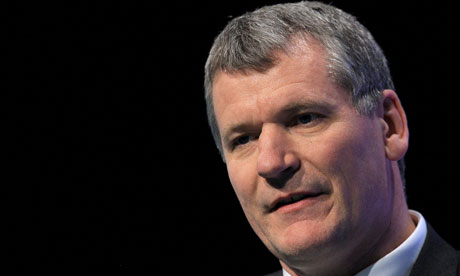Rutashubanyuma
JF-Expert Member
- Sep 24, 2010
- 219,470
- 911,173
[h=1]David Gill slates FA colleagues for Manchester United victimisation[/h] United's chief executive complains of raw deal for champions
Gill claims harsh punishments not meted out to rivals
Gill claims harsh punishments not meted out to rivals
- Daniel Taylor
- guardian.co.uk, Thursday 30 June 2011 00.05 BST Article history
David Gill believes Manchester United are unfairly targetted by the FA. Photograph: Andrew Yates/AFP/Getty Images
David Gill, the Manchester United chief executive, has criticised his colleagues at the Football Association, accusing the organisation of victimising his club with undue punishments that would not be meted out to its Premier League rivals.
Gill, an FA board member, cited Wayne Rooney's two-game suspension for swearing into a television camera after scoring at West Ham in April, as well as the five-game touchline ban imposed on Sir Alex Ferguson because of his castigation of the referee Martin Atkinson, to demonstrate his belief that the champions get a raw deal from the sport's governing body.
"I do genuinely believe there have been some poorish decisions that, in my opinion, wouldn't necessarily have hit other clubs," Gill said. "That's not to say I'm condoning Wayne's comments, because I don't think they were correct, or what Sir Alex said, because it wasn't helpful. But at the same time, the actual punishments were harsh.
"We're possibly being caught up in being one of the biggest clubs and the [FA's] Respect agenda being there. What better way to demonstrate the authorities are being tough than by hitting one of the biggest clubs the hardest?"
Gill's comments in Champ19ns, a book about United's record title-winning season by Steve Bartram, are a break from the norm for one of the game's political movers, and signal the strength of feeling inside Old Trafford that the FA is likely to show greater leniency to other clubs. Ferguson has long felt the FA victimises United, a view he has held for well over a decade, describing the disciplinary department as a "dysfunctional unit", whereas the club's legal adviser, Graham Bean, has accused the FA of acting "like a communist state".
Ferguson's touchline ban meant he was the first manager in history to be prohibited from entering the dugout when his team were playing at Wembley, in the FA Cup semi-final against Manchester City. Rooney's punishment also meant him missing the game, which United lost 1-0, and the ill feeling was exacerbated by Ferguson being charged with improper conduct the following month for describing Howard Webb as "the best referee in the country", contravening a rule about not talking about match officials before matches. Ferguson was so outraged he refused to acknowledge the charge and the punishment was reduced to a warning.
Gill questioned whether the FA has set a "dangerous course" by punishing Rooney and suggests it would not have happened had he played for another club.
"The club doesn't condone it [Rooney's swearing], but Wayne recognised it was wrong and apologised almost immediately. We have various issues with the ban: one being consistency. What's going to happen now? Is the referee under pressure to send everyone off?
"I think sometimes in celebration people do swear and all that means is that, to my mind, it's a dangerous course the FA has gone down, because consistent application is what's required and I'm not sure that'll necessarily happen. There are certain things you should wait until the start of the season to change.
"But it's a lesson to Wayne. He subsequently scored a great goal against Chelsea and smiled that's what we want to see. There should be exuberance, but you look at the abuse to which he was subjected [by West Ham supporters] and I know people say you've got to rise above it, but I defy anyone being vilified to that level always to retain your cool. I don't think the media helped either, with the constant repetition of footage, with his mouth blurred out."
Gill recounted the "bolt from the blue" of Rooney informing the club he wanted to leave, starting with a telephone call from the player's agent, Paul Stretford, on 14 August.
"We already had some discussions [about a new contract] going on, then I had a call indicating Wayne didn't want to sign a new deal, [that] he had some issues and didn't want to sign a new contract.
"That was the first we'd heard of it because [before then] there had been discussions going on to a timetable that had been agreed. I was pretty shocked, to be honest. I had a good working relationship with Paul Stretford, having done deals with him over a number of years and there was never any indication that this was the call he was going to make."
Rooney changed his mind after several weeks of lobbying behind the scenes "I wouldn't say there were discussions every day but there was regular contact," Gill said and John O'Shea recounts in the book how the players reacted to a team-mate questioning whether the other players were good enough to challenge for trophies.
"It transpired it was just an interesting technique of getting a new deal," O'Shea said. "I think Wayne, if he could turn back the clock, might do things a bit differently, but both parties were happy in the end.
"He came [into the Carrington dressing room after signing his new deal] and apologised to everyone. He said he'd done what he had to do, basically, and he was sorry if he had offended anybody. Obviously there were a few comments that will stay in the dressing room. They were quite smart and funny, but all friendly."
